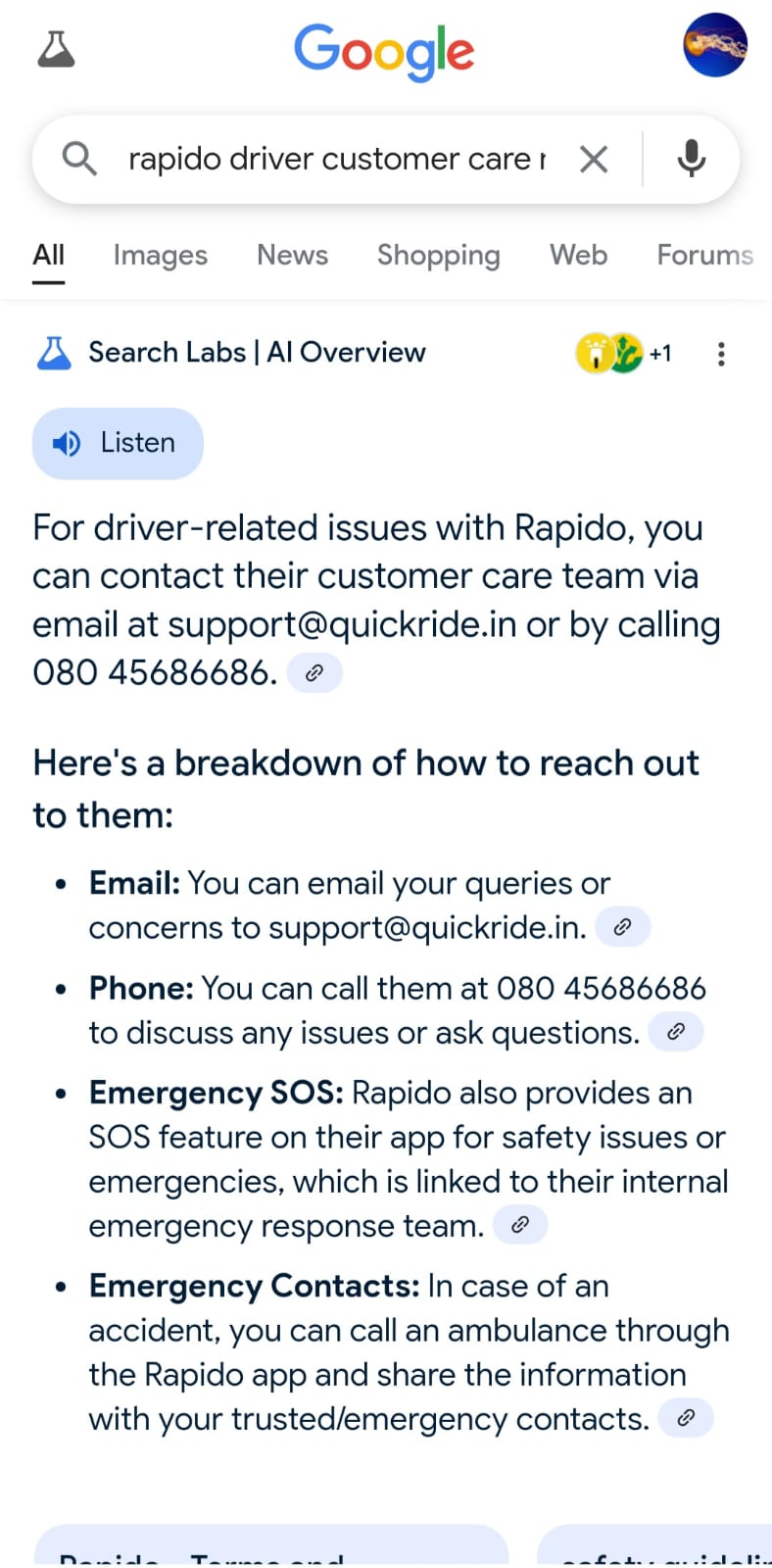
How a Google AI search glitch led to a month-long ordeal for this Bengaluru-based startup


Bengaluru-based carpooling and cab-hailing platform Quick Ride experienced a tenfold surge in customer care call volume over the course of a month. This sudden spike in call traffic was triggered by inaccurate information shown in Google Search’s Generative Artificial Intelligence (GenAI) feature, known as Google AI Overview, the company claimed.
Founded a decade back, Quick Ride offers a mobile application that facilitates carpooling, bike pooling, and taxi services across major Indian cities, including Bengaluru, Chennai, Hyderabad, Pune, Mumbai, Delhi-NCR, Kolkata, Kochi, and Thiruvananthapuram. The company reports that it has over 50 lakh registered users.
In the first week of March, Quick Ride’s team discovered that an unexpected surge in customer care traffic was caused by a mix-up in Google’s AI Overview. When users searched for Rapido’s driver (Rapido Captains) support contact details, the firm alleges that the AI-generated summary incorrectly displayed Quick Ride’s phone number and support email address. (The query was: Rapido driver customer care number).

“It caused a major disruption for us. Our actual customers couldn’t reach us because our support lines were completely overwhelmed. As a carpooling service, we don’t typically require a large support team. But suddenly, we were flooded with calls from Rapido Captains regarding their specific queries. Since we don’t have the bandwidth for that kind of volume, our limited support staff was stretched thin,” co-founder and CEO of Quick Ride KNM Rao told TechCircle.
TechCircle could verify that the incorrect information was displayed till April 10. As of Monday, the AI Overviews section for the query has been removed.


(Screenshot from April 10)
Rao also said that the issue was reported to both Google and Rapido. However, multiple queries sent to Google remained unresolved. Apart from the delinking of the contact information, Quick Ride has also sought compensation for losses and disruption caused.

Media queries sent to Google and Rapido remain unanswered till the filing of this story.
Notably, Quick Ride has over 100 employees, while Rapido has close to 4,000. As per reports, Swiggy-backed Rapido undertakes 17 lakh rides per day across all its verticals.
Currently, Quick Ride’s official website has updated its contact section to prominently display Rapido’s customer care number (alongside its own details) to prevent further mix-ups. The site carries a disclaimer, “We’re not Rapido! Google AI got a little too creative and rerouted Rapido calls to us. But we’re Quick Ride – your go-to for carpooling and taxis, not bike rides!”


Challenges with AI search
Google AI Overview which provides AI-generated summaries at the top of Google search results, first rolled out in May 2024. The feature is based on its Gemini Large Language Model (LLM). It generates short summaries in natural, human-understandable language. At the bottom of every query, it does display “Generative AI is experimental.” It has been shown to hallucinate or generate misinformation in some cases. For example, when it was first introduced, the feature suggested mixing non-toxic glue into pizza sauce to stop cheese from sliding off.
“When we talk about the output from Google’s generative AI — particularly these AI Overviews — it’s important to understand that generative AI systems built on LLMs are probabilistic in nature. That means their outputs are generated based on likelihoods derived from patterns in data, which makes them inherently prone to hallucinations — or confident, factually incorrect statements,” said Jayanth Kolla, co-founder and partner at Convergence Catalyst, a Bengaluru-based tech consultancy.

Kolla pointed out that the generative AI system might have been misled by the similarity in the meanings of the two company names, which could have contributed to the confusion.
He also noted that while hallucinations in newer LLMs have reduced, safeguards are still essential—especially for critical enterprise data like customer care numbers. He added that while Google may have rapid correction systems for large clients, the issue here reflects a broader challenge involving AI limitations, account prioritisation, and slower support for smaller businesses.
“LLMs powering AI summaries aren’t built for factuality. Even at 99.9% accuracy — which is higher than current levels — Google-scale systems could still produce millions of errors daily. While most are harmless, some, some can be disruptive,” said Kashyap Kompella, AI analyst and CEO of research firm RPA2AI

AI can’t reliably fact-check itself, and users can’t be expected to verify every source. Including links in summaries helps, but if those sources are also AI-generated or weak, the problem persists, he added.
“For years, users have trusted top Google results to be vetted and reliable. AI summaries are now challenging that trust, especially for simple facts like contact details, where users don’t expect to double-check. Until we find the right balance between AI and traditional search, such mistakes will continue.”
Earlier this year in February, US-based educational services firm Chegg sued Google, alleging that its AI Overviews feature diverts user traffic away from Chegg's website, harming its revenue and business prospects.
Other AI-powered search platforms have also faced issues like misinformation, hallucination, and plagiarism. Perplexity AI, seen as a potential Google Search rival, came under fire for using content from news outlets and paywalled sites. Last year, Condé Nast sent a cease-and-desist letter demanding it stop using content from publications like The New Yorker and Vogue, according to The Information.
